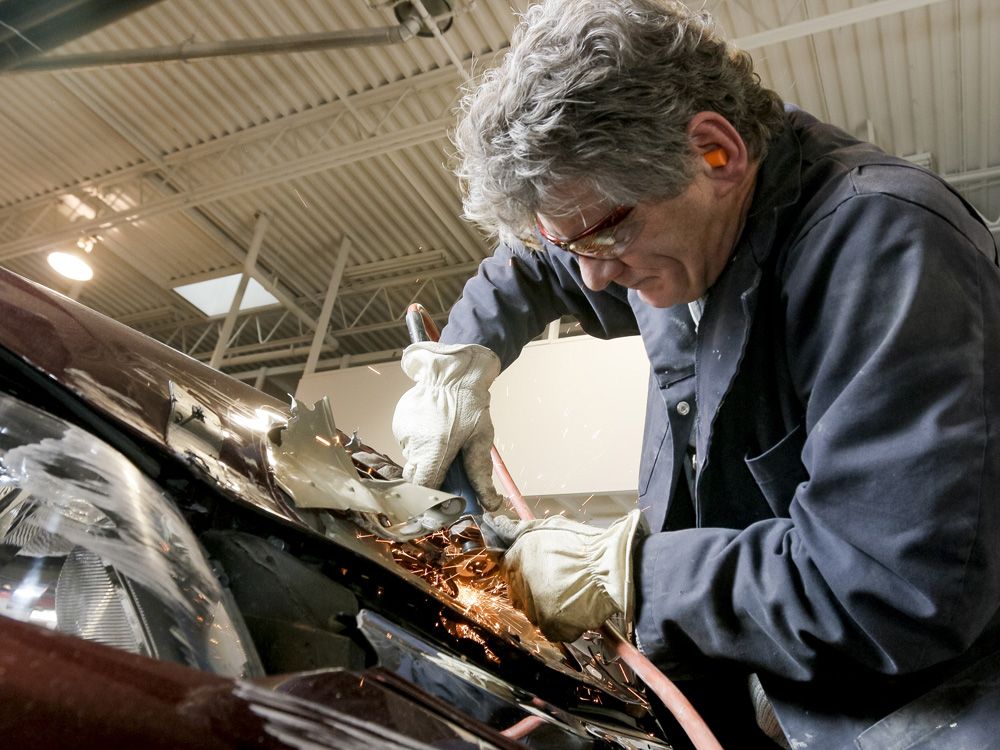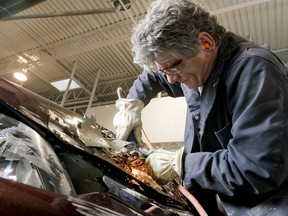Vass Bednar: Self-preferencing is cannibalizing Canada’s auto-repair industry

Soon, we might not even be able to compare insurance rates

Article content
Cars are beautifully emblematic of the forces that are reshaping the economy.
Advertisement 2
Story continues below
Article content
Key features that used to be owned, such as heated seats, remote start, automatic high beams or even the radio, are now subscription-based. Their component parts are increasingly produced by “original equipment manufacturers,” or OEMs, which restricts consumer choice when it comes time to do repairs. Automakers currently own the data transmitted by vehicles, which also restricts choice, because those vehicles can only be fixed by shops that have access to the data. On top of all this, private equity firms have been consolidating the auto-collision repair industry, making it harder to shop around for a better deal.
Article content
Now this: insurance companies are purchasing auto-repair shops as a strategy to eliminate competition and put themselves in positions to exploit the very same consumers that they purport to protect. In similar instances, they enter into exclusive agreements with a network of collision repair firms. These are called “direct repair programs” and they are reshaping the car repair marketplace.
Advertisement 3
Story continues below
Article content
In 2015, Toronto-Dominion Bank’s insurance arm opened its own shops and Intact Financial Corp. is now doing the same by purchasing RSA Insurance Group plc, further constraining consumer choice. Intact, Aviva plc, and Desjardins Group are consolidating Canada’s insurance industry, while outfits such as Driven Brands Inc.’s Carstar; Boyd Group Services Inc.; and Mondo Fix Inc., the owner of Speedy Auto Service and other brands, are concurrently consolidating collision repair garages.
With insurance companies opening their own auto-repair shops, and private equity backed groups such as Boyd seeing their shares drop, it seems likely that more consolidation will occur; and as it does, consumer choice could essentially disappear.
Advertisement 4
Story continues below
Article content
These direct linkages — filing an insurance claim and receiving an appraisal, having a car repaired, and potentially even renting a car in the interim — have been presented to consumers as a wonderful source of convenience. It is also convenient for the insurance firm, which generates more business from clients held hostage by their direct repair agreements.
This sort of coercion is a form of “self-preferencing.” The analog in an online context would be that if you search for an item online, you can only purchase the marketplace’s version of that item, or you forfeit your ability to shop altogether. The bargain is akin to the vertical integration that “health maintenance organizations,” HMOs, deploy in the United States, where individuals aren’t insured if they go out of the HMO’s network to receive care.
Advertisement 5
Story continues below
Article content
It seems as if insurance companies have an inherent conflict-of-interest when they also own a collision repair shop. As a result, they could be more likely to deny someone’s insurance claim, pay out less, overcharge for services, or cut corners on the quality of the repair. Think the suggestion that a repair shop would cut corners is going too far? The industry has also seen significant regulatory rollback; recall that Ontario’s College of Trades inspectors have been checking if technicians have the proper licence less often, if at all.
The innovation of insurance direct-repair programs endows insurers with more market power, which essentially enables them to suppress the “door rate,” a term used to describe the hourly rate charged by dealers on standardized units of service work. This hurts the trade as it will become increasingly difficult to find skilled technicians that are seeing their wage decreased under these direct arrangements. The average collision repair shop that participates in these agreements with insurers is likely to have a lower door rate than independent mechanics.
Advertisement 6
Story continues below
Article content
Wages are relevant because today’s vehicles are becoming increasingly difficult to repair and are not as easily serviceable due to their increased complexity and digitization. Parts are more specialized and vehicle warranties can perversely prevent easy or interchangeable repair. While an insurance policyholder may pay for OEM part replacement endorsements, the insurance company may mandate the use of aftermarket and recycled parts in defiance of the manufacturer’s warranty; this could create a dissonance between what has been guaranteed for the policyholder and what the insurance company may direct a collision shop to use in order to save money and earn more on the repair.
-

Vass Bednar: Why is Canada ignoring the latest publishing mega-merger?
-

Vass Bednar: The federal government bought a pipeline. Maybe it should buy Shaw?
-

Vass Bednar: Canadians want more competition in banking but regulators stand in the way
Advertisement 7
Story continues below
Article content
Another reason wages are relevant here is the prospective monopsonistic power of the estimating software that insurers use: Mitchell and Qapter (formerly Audatex). The influence of these platforms could grow to control wages for auto repair work.
Insurance direct-repair programs are potentially exploitative schemes that enable insurers to circumvent competition from independent repair shops that have their own expertise. Technicians have been grousing about this trend informally but could face professional repercussions for speaking out. The Access to Markets initiative in the U.S. has been speaking to entrepreneurs and small business owners about competition issues over the past few years — and independent business owners across numerous industries fear retaliation from gatekeeping platforms or monopolistic competitors. Comparable engagement does not exist in Canada but could come from the Canadian Federation of Independent Business.
Advertisement 8
Story continues below
Article content
We may be quickly approaching a bubble of sorts in the collision repair industry, which is suffering due to enduring supply-chain issues and skilled trade labour shortages. Insurance companies could be cheating consumers, small business owners, and workers through these programs and these stakeholders are increasingly on the wrong end of an asymmetrical bargaining position in markets.
Insurance companies are looking to control the whole aspect of the claim in order to control how money is dispersed. Perhaps government policy should prevent insurance companies from owning their own repair shops as a mechanism to preserve consumer autonomy. This would not be without precedent, as legislation already prevents large drugstore chains from acquiring or granting exclusivity or preference to a generic drugmaker.
While we have yet to explicitly address whether this behaviour of self-preferencing is anticompetitive in a digital context, the similarity between pharmacies and drugs and insurers and car repair is striking. This practice is cannibalizing Canada’s auto-repair industry, leaving consumers at risk of being screwed over. Soon, we might not even be able to compare insurance rates. We can do better, and we need to repair Canada’s competition landscape.
Advertisement
Story continues below








